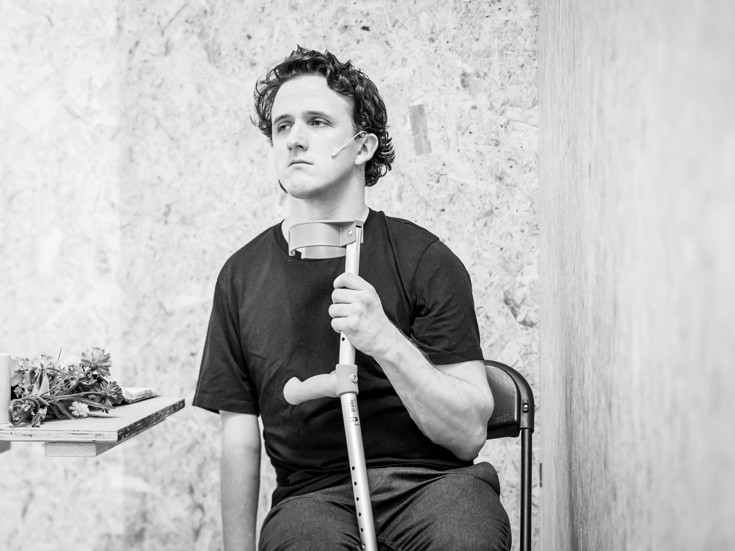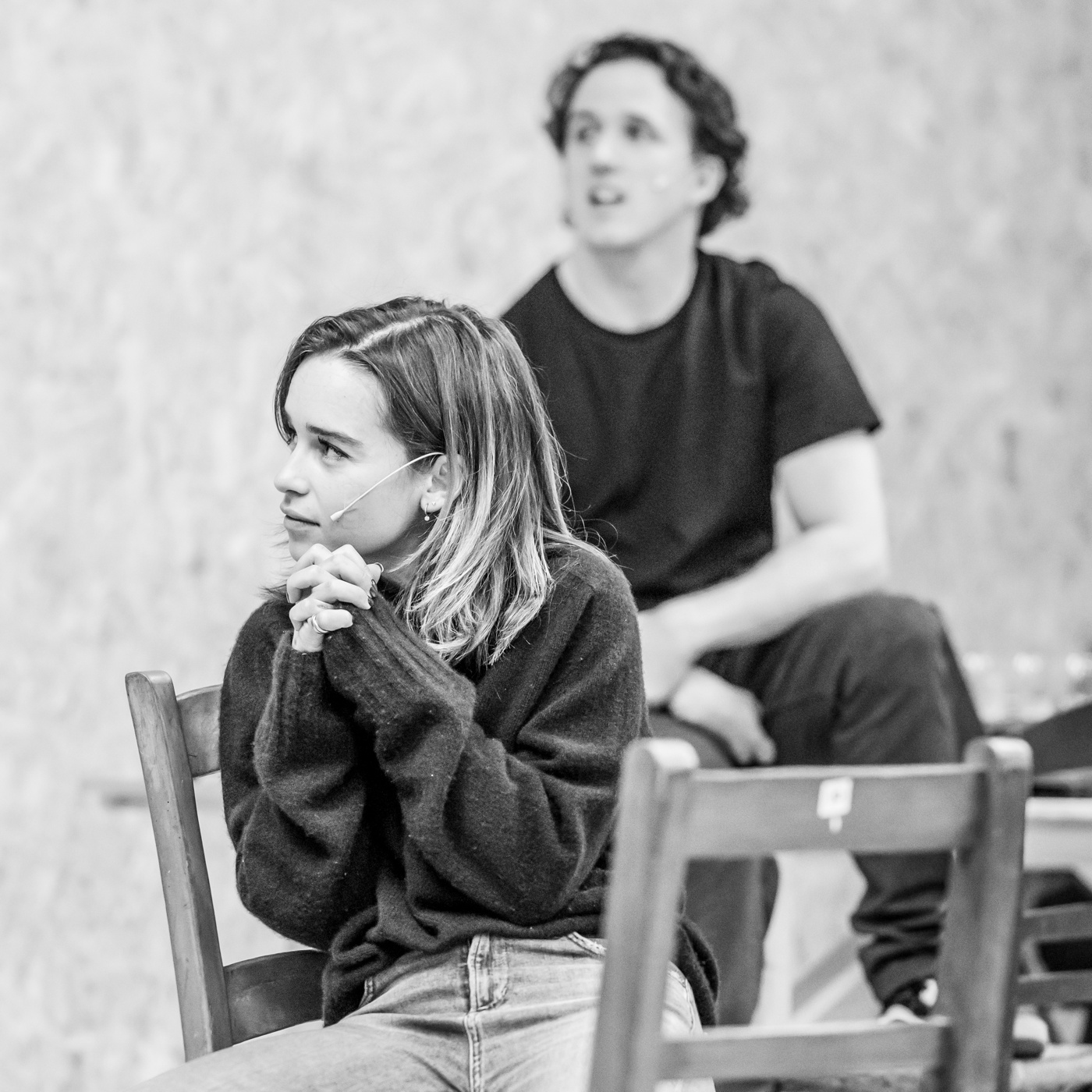Daniel Monks on Starring in London's The Seagull with Emilia Clarke and Why He's an Ali Stroker Super Fan

(Photo: Marc Brenner)
Daniel Monks electrified London at the end of 2019 playing the title role at the Donmar in Teenage Dick, Chinese-American writer Mike Lew’s teasingly titled play that transposes Shakespeare’s Richard III to the competitive environs of an American high school. But rather than return to his native Australia, Monks has stayed on in London to play the anguished son Konstantin in the director Jamie Lloyd’s new production of Chekhov’s The Seagull, co-starring Emilia Clarke as Nina and starting performances March 11 at the Playhouse Theatre. Monks is hemiplegic, or paralyzed on one side, following complications from a biopsy on a spinal cord tumor when he was 11. But the vibrant, immensely engaging actor looks forward to playing as broad a range of roles as possible, as he told Broadway.com.
Is London home now, following the major attention you received in the Donmar premiere of Teenage Dick?
Londonis home now, and I’m incredibly excited! I had been in Sydney for 10 years and was looking forward to making the move and am now here indefinitely: I’m very grateful and happy.
How does it feel to go from Mike Lew’s radical rewrite of Shakespeare to Anya Reiss’ contemporary take on Chekhov?
I’ve never done a professional Chekhov before but I did play Konstantin in an acting class in 2012, so I definitely knew the play and I’ve seen it three or four times, as well. What we’re trying to do is really strip away the layers of history associated with this play and get to the core human truth of it in as distilled a way as possible—to get to the heart of the story Chekhov is telling.
How would you characterize the challenge of playing Konstantin?
It’s like a gift for an actor in that it’s the meatiest role you can have in its exploration of a character struggling with mental health. He so desperately wants to love and is trying to love but is also trying to survive without having support, especially from his mother.
Konstantin is written by Chekhov as a playwright forever in search of “new forms,” but have you ever wondered if he’s actually a good playwright?
I, Daniel, would defend him to the grave! My job is to be subjective with him, and I find myself very protective of the play he has written [in the first act of The Seagull], and I do think it’s a good play and that he’s a great playwright. The thing with Konstantin is that he wants to communicate but doesn’t necessarily have the tools to reach his audience: he’s a little bit too in his head!
Can you see a continuum in Jamie Lloyd’s style here between this production and his hugely successful 2019 West End revivals of Betrayal and Cyrano de Bergerac?
Very much so: this so far hasn’t felt like a traditional Chekhov acting style. It’s almost like the intimacy you saw in those earlier productions is here, too, the difference being that Cyrano allowed for such electrically charged scenes. This play has those but also comes with the repression that exists within this family and the tension that results from that: we’ve been going for stillness so far—a lot of stillness.

(Photo: Marc Brenner)
How has it been sharing the stage with this production's big name, Emilia Clarke, who plays the young actress, Nina, whom Konstantin loves to distraction?
I’d heard that Emilia was a really lovely person and she is. It’s been such a joy to work with her. Our big final scene together is one of my favorite scenes from the play, and to do that with her requires a level of trust that hopefully will translate and be powerful to an audience.
Have you seen Game of Thrones, in which Clarke made her name playing Daenerys Targaryen?
I haven’t but I have seen Gay of Thrones, Jonathan Van Ness recap show of it, so I know everything that happens!
Does this part exist on a continuum with the covetous Richard in Teenage Dick?
Both are very unhappy and have a lot of pain but with Richard’s pain it becomes homicidal whereas Konstantin becomes suicidal: one explodes and the other implodes. Also, Teenage Dick felt like an exploration of being disabled in a deeply ablest society whereas in The Seagull, my disability is purely incidental—which is wonderful, as well.
Does your casting in this play help signal a long-overdue recognition of the disabled community within mainstream theater?
Totally, and that’s been very exciting for me. I saw Ali Stroker on Broadway in Spring Awakening and have been following her career ever since and wasn’t surprised when she went on to win the Tony [for Oklahoma!]. I had been used to not seeing myself represented and feeling very “othered” as a result, and the more we see disabled bodies and people on stage, the more normalized disability becomes and the less “othered.” Disability is only one tiny part of me, so to play a romantic character who is also a lead feels incredibly exciting.
Has your own life experience fed your approach to Konstantin?
Sure, insofar as I’m not afraid to go to those difficult, hard places because I’ve been there before and I’ve found my way, and I do feel as if that perhaps has given me a deeper empathy for people in pain. When you go to hell and back, you discover some kind of resilience. I do feel a better, richer actor because of the experiences I’ve been through.
Have you always wanted to act?
When I was a kid, before I became disabled [at age 11], all I wanted to do was act purely from an attention-seeking point of view. But it was only when I was 25 that I decided to do it. My professional debut in Australia was as Joseph Merrick [the inspiration for the play The Elephant Man] in a new play about his life, and that felt like the first of a trilogy: Joseph, Richard, and Konstantin—that would be an interesting dinner party to be at!
You mention having seen the DeafWest Spring Awakening on Broadway: do you get to New York much?
New York is one of my favorite places on earth! For years I would save up throughout the year and fly from Australia to New York to spend at least two weeks seeing Broadway shows and spending time at the Performing Arts library [at Lincoln Center]. On a recent visit there, I saw the Mike Nichols Seagull with Meryl Streep, and also the one with Carey Mulligan and Kristin Scott Thomas.
What about musicals—surely as a performer you must have some sort of wish list there?
Look, I really love musicals but I can’t sing to save my life, which has nothing to do with my disability. [Laughs.] You can’t win them all!